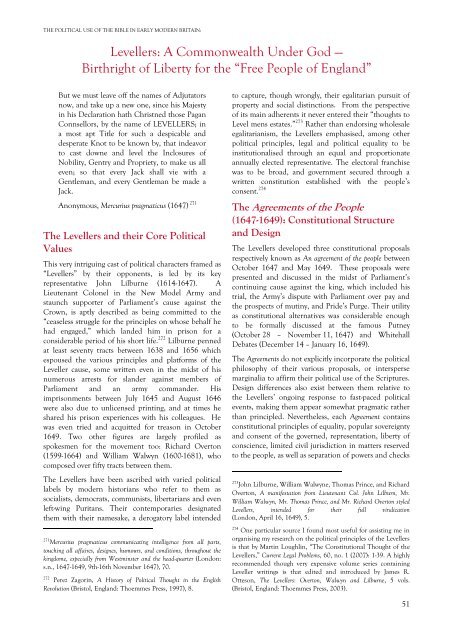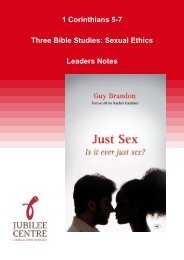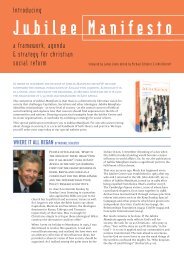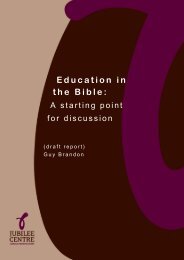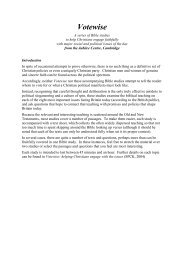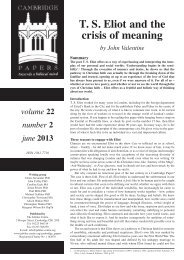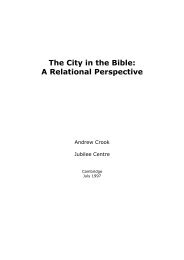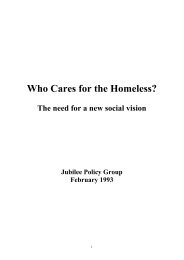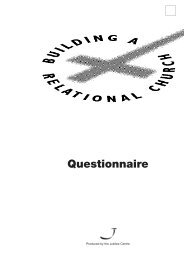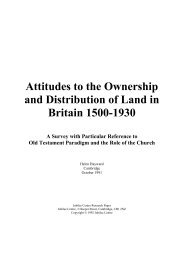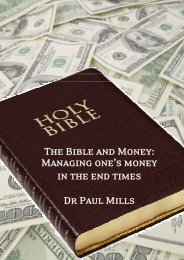Report Template - Jubilee Centre
Report Template - Jubilee Centre
Report Template - Jubilee Centre
You also want an ePaper? Increase the reach of your titles
YUMPU automatically turns print PDFs into web optimized ePapers that Google loves.
THE POLITICAL USE OF THE BIBLE IN EARLY MODERN BRITAIN:<br />
Levellers: A Commonwealth Under God —<br />
Birthright of Liberty for the “Free People of England”<br />
But we must leave off the names of Adjutators<br />
now, and take up a new one, since his Majesty<br />
in his Declaration hath Christned those Pagan<br />
Connsellors, by the name of LEVELLERS; in<br />
a most apt Title for such a despicable and<br />
desperate Knot to be known by, that indeavor<br />
to cast downe and level the Inclosures of<br />
Nobility, Gentry and Propriety, to make us all<br />
even; so that every Jack shall vie with a<br />
Gentleman, and every Gentleman be made a<br />
Jack.<br />
Anonymous, Mercurius pragmaticus (1647) 271<br />
The Levellers and their Core Political<br />
Values<br />
This very intriguing cast of political characters framed as<br />
“Levellers” by their opponents, is led by its key<br />
representative John Lilburne (1614-1647). A<br />
Lieutenant Colonel in the New Model Army and<br />
staunch supporter of Parliament’s cause against the<br />
Crown, is aptly described as being committed to the<br />
“ceaseless struggle for the principles on whose behalf he<br />
had engaged,” which landed him in prison for a<br />
considerable period of his short life. 272 Lilburne penned<br />
at least seventy tracts between 1638 and 1656 which<br />
espoused the various principles and platforms of the<br />
Leveller cause, some written even in the midst of his<br />
numerous arrests for slander against members of<br />
Parliament and an army commander. His<br />
imprisonments between July 1645 and August 1646<br />
were also due to unlicensed printing, and at times he<br />
shared his prison experiences with his colleagues. He<br />
was even tried and acquitted for treason in October<br />
1649. Two other figures are largely profiled as<br />
spokesmen for the movement too: Richard Overton<br />
(1599-1664) and William Walwyn (1600-1681), who<br />
composed over fifty tracts between them.<br />
The Levellers have been ascribed with varied political<br />
labels by modern historians who refer to them as<br />
socialists, democrats, communists, libertarians and even<br />
left-wing Puritans. Their contemporaries designated<br />
them with their namesake, a derogatory label intended<br />
271 Mercurius pragmaticus communicating intelligence from all parts,<br />
touching all affaires, designes, humours, and conditions, throughout the<br />
kingdome, especially from Westminster and the head-quarter (London:<br />
s.n., 1647-1649, 9th-16th November 1647), 70.<br />
272<br />
Perez Zagorin, A History of Political Thought in the English<br />
Revolution (Bristol, England: Thoemmes Press, 1997), 8.<br />
to capture, though wrongly, their egalitarian pursuit of<br />
property and social distinctions. From the perspective<br />
of its main adherents it never entered their “thoughts to<br />
Level mens estates.” 273 Rather than endorsing wholesale<br />
egalitarianism, the Levellers emphasised, among other<br />
political principles, legal and political equality to be<br />
institutionalised through an equal and proportionate<br />
annually elected representative. The electoral franchise<br />
was to be broad, and government secured through a<br />
written constitution established with the people’s<br />
consent. 274<br />
The Agreements of the People<br />
(1647-1649): Constitutional Structure<br />
and Design<br />
The Levellers developed three constitutional proposals<br />
respectively known as An agreement of the people between<br />
October 1647 and May 1649. These proposals were<br />
presented and discussed in the midst of Parliament’s<br />
continuing cause against the king, which included his<br />
trial, the Army’s dispute with Parliament over pay and<br />
the prospects of mutiny, and Pride’s Purge. Their utility<br />
as constitutional alternatives was considerable enough<br />
to be formally discussed at the famous Putney<br />
(October 28 – November 11, 1647) and Whitehall<br />
Debates (December 14 – January 16, 1649).<br />
The Agreements do not explicitly incorporate the political<br />
philosophy of their various proposals, or intersperse<br />
marginalia to affirm their political use of the Scriptures.<br />
Design differences also exist between them relative to<br />
the Levellers’ ongoing response to fast-paced political<br />
events, making them appear somewhat pragmatic rather<br />
than principled. Nevertheless, each Agreement contains<br />
constitutional principles of equality, popular sovereignty<br />
and consent of the governed, representation, liberty of<br />
conscience, limited civil jurisdiction in matters reserved<br />
to the people, as well as separation of powers and checks<br />
273 John Lilburne, William Walwyne, Thomas Prince, and Richard<br />
Overton, A manifestation from Lieutenant Col. John Lilburn, Mr.<br />
William Walwyn, Mr. Thomas Prince, and Mr. Richard Overton styled<br />
Levellers, intended for their full vindication<br />
(London, April 16, 1649), 5.<br />
274<br />
One particular source I found most useful for assisting me in<br />
organising my research on the political principles of the Levellers<br />
is that by Martin Loughlin, “The Constitutional Thought of the<br />
Levellers,” Current Legal Problems, 60, no. 1 (2007): 1-39. A highly<br />
recommended though very expensive volume series containing<br />
Leveller writings is that edited and introduced by James R.<br />
Otteson, The Levellers: Overton, Walwyn and Lilburne, 5 vols.<br />
(Bristol, England: Thoemmes Press, 2003).<br />
51


